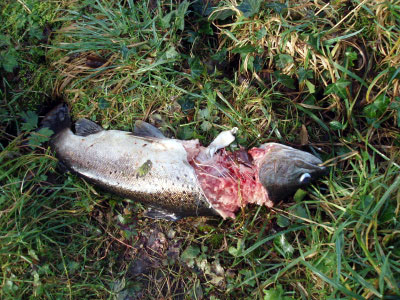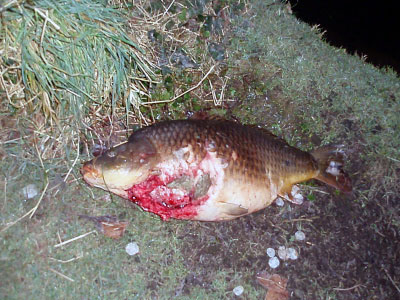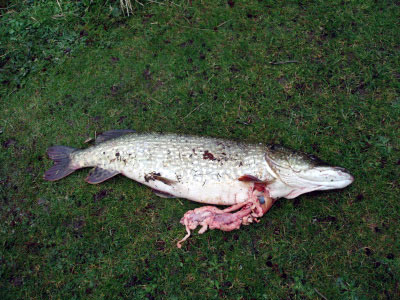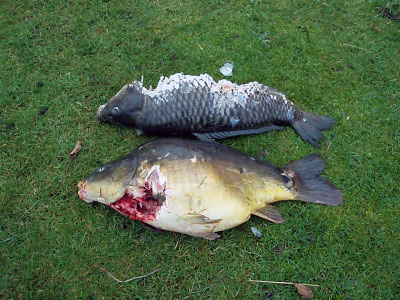David Cameron has been intimating for some time now that he considers that this country has deteriorated in many ways over the last few years, and a recent poll showed that 70% of the people questioned were also of the same opinion. Even as I began to write this article the postman arrived, and among the mail was a leaflet headed, ‘HM Government,’ and titled, ‘Tackling Anti-Social Behaviour.’ Now, I don’t care what anyone says, since I was a young teenager, I could fish in the Richmond and Twickenham areas along the towpaths after dark – things have become so bad that I would be frightened to do so now.
Certainly in my 81 years on this planet I have seen many changes in Britain’s culture, some for the better and some not so good, and whether I am right or wrong, one of the things that I consider to have become more of a normality than it was in my youth is the double standards that seem to be applied to many situations.
As an example, most of my friends seem to think there are more rights for criminals than for their victims. That one is allowed to defend oneself against an attack on one’s person, but not allowed to use force to retain one’s property from any villain trying to steal it or vandalise it. It appears that if one tried to make a citizen’s arrest these days, one is likely to end up in the courts and treated with far less leniency than the villain, if he made a complaint against you.
We see double standards in the way that our parliamentarians conduct themselves, and the way that politics appears to be more important than right or wrong, and we all know about the expenses scandals, and so on, and so on, and so on……………………….
 |
|
Trout of about 7lbs |
What has all this to do with otters? I think the double standards applied to the tax paying public who are forbidden to protect their property against this particularly wilful killer is outrageous. If we consider the farmer who has a problem with a dog worrying his sheep, he has a perfect right to shoot the animal, but an otter can kill thousands of pounds in value of fish in a private water and one is not allowed to do anything about it. The stupidity of it all is equal to the stupidity that was used to protect cormorants on the misunderstanding that they were under the threat of diminishing numbers – when it was the shag that had shown a deterioration in their populations. I have written this before, but the Avon and Dorset River Board, back in the 1950’s, would pay 5 shillings for every cormorant beak presented at the office, as they considered, even back then, that they were a menace to fisheries. Who, I wonder, were the idiots who placed a Protection Order on cormorants?
I hold the Government of the day responsible for the problems caused by signal crayfish, and the commercial fish farming industry; both of which were allowed into this Country for some to make a few bucks, in spite of there being ample evidence of the damage such ventures would cause to rivers and fisheries. And I believe that all politicians will pander to any pressure from groups if they think it will be politically useful, such as protecting cormorants or otters.
The argument that otters had gone down in numbers due to farming methods and problems in water quality is wrong – here in the south anyway. Dogs were specially bred as otter hounds to be used to hunt the animal, either when accompanying hunters on horseback or on foot. I remember on a couple of occasions seeing an otter hunt, and an otter-cub hunt, on the Dorset Stour when I was fishing there as a young man. I had seen otters on the river, and where I saw them the otters became resident for a while, and in that area the fishing became a waste of time. I surmised that the fish had been either killed or moved to a safer stretch of river.
The fact is that because they did terrible damage to fisheries, otter numbers gradually diminished because they were hunted and persecuted as the pests that they are. I remember several years ago when Bernard Aldrich, the well respected keeper of the Broadlands Fishery on the River Test, when giving a speech to the Romsey and District Society, very happily mentioning the fact that there had not been a sign of an otter that year between Stockbridge and Broadlands, which was several miles downstream of Stockbridge. None of the audience said, “Oh! What a shame.” People in those days knew that despite the otter being a very attractive, intelligent and enchanting animal, they were pests.
 |
|
“They kill without reason” |
About 3 years ago I was informed that, of 15 salmon redds identified at Broadlands, on half of them the salmon had been removed by otters – and salmon are supposed to be an endangered species. Also otters had raided a trout rearing farm farther down at Testwood.
By coincidence, when I mentioned to a neighbour that I was going to pen an article for the website ‘Fishing Magic,’ about the damage caused by otter kills on my own fishery, she told me that the whole front page of our local newspaper that week, the ‘Romsey Advertiser,’ February 5th., was devoted to a story how otters had wiped out a fish farm stock of carp. Mark Simmonds had said that 105 of his 122 large carp, valued at £30,000 were dead or dying from otter attacks. Some of the fish were worth a couple of thousand pounds each on today’s market, and he had already had to close 5 out of 10 sites that he had for rearing carp due to attacks by otters. This particular fish farm could not be defended from the otter because it was not possible to even put an electric fence around the site.
On the same page, the Hampshire Wildlife Trust’s otters and river projects officer, Mr. Graham Roberts, said, “Otters had made a natural recovery and had an important role to play on the water.” Otters were introduced into Hampshire and are bred in Hampshire, and nobody has ever given a good reason as to what important role they play on the water. Otters are at the top of the tree in the ecology systems of waters, running or stillwaters, and there is nothing to cull them other than man, or motor cars. No person who knows anything about the history of otters would agree that they should be allowed to breed uncontrolled to ruin the legitimate sport of millions of anglers, or decimate stocks of fish. Creatures at the top of the tree that are uncontrolled by other forms of nature upset the ecology; just look at man and the trouble in the world through his uncontrolled expansion of population.
The same article had some comments by some spokesperson from the Environment Agency who said, “Steps should be taken to prevent otters gaining access to the fish while still allowing them to travel freely along watercourses.” How the bloody hell is one able to do that other than by removing all the fish? The older I get the more cynical I get at the absolute crap that comes from authorities.
 |
|
A seventeen pound pike |
Otter lovers like to blame everything but otters for the damage they do, such as mink. For one thing, mink have been around now for many years but it is only since the introduction of otters that the fish kills have become prevalent, and it needs a very strong animal to kill and remove from the water, sometimes up very steep banks, fish of considerable weight. Fish kills of fish upwards of 15lb with their throats ripped out, have appeared on the riverside where the banks are vertical, and there is not another animal but an otter that could do that – unless someone has also released bears.
What many naturalists do not appear to take into account, or being ‘blinkered,’ dismiss from their thoughts – much as they dismiss damaged fisheries – is that otters love eggs, and will doubtless make inroads into the nests of waterside birds, even if they don’t take the birds. There is already evidence that they disrupt water birds within their environment, but none of this ever seems to be mentioned. I know mink take water birds having seen that with my own eyes, so I cannot believe that otters would not do the same.
One of the reasons I dislike otters, although I do think they are a beautiful animal, is that they are like cats. They kill without reason. They are not content to just kill what they can eat, as all the evidence I have found of their presence on my fishery is that only a small amount of the carcase of their kill is eaten and the rest is left. They don’t return to finish their meal but just kill again when they are hungry, or perhaps playful (?) or teaching their young to hunt. Even eels, supposed to be their favourite food are not all consumed. I find half-eaten eels on the grass at times. I am thankful that otters are not resident on my fishery due to too many bankside dwellings, or I think that by now my fishery would have been ruined. I am not happy though at losing carp that I have watched grow over the years from a few pounds when they first appeared, owing to flooding I believe, to a reasonable size. At least 4 carp averaging 14lb have been killed, several brown trout upwards of 6lb, and a 17lb pike was lugged from the water a couple of feet vertically, had the throat and some of the guts ripped out, and then left. None of it was eaten, which is another reason I believe they kill for the sake of killing. They also seem to attack the larger fish. They have also killed and left grayling after very little was eaten, and only a small amount was eaten of a salmon they killed .
The difficulty for me is that I don’t know what is killed that I don’t find evidence of, if cats or foxes have taken it away. Or if any kills are not removed from the river by the otter. We found one carp about 15lb with its throat ripped out still alive in the river, but obviously dying, so we put it out of its misery.
When I stayed with John Wilson and fished the River Wensum, nearly every fish we caught was marked in some way, and according to John it was damage by otters, and I am mentioning this because he had to fence off the carp ponds on his property to keep the otters from killing his fish. So the animal can be kept at bay by fencing, but at what cost? And why should one have to pay many thousands of pounds to protect one’s fishery – but that does not alleviate the problem from rivers which cannot be fenced. When most stillwaters are fenced to keep this pest away, it will simply mean that there will be greater pressure on the stocks of fish in rivers and streams.
 |
|
Carp – averaging about 14lbs |
A great many anglers gain access to waters through angling clubs, so is it right that they may have to pay thousands of pounds from club funds to protect any stillwaters they own or rent from otters? Because, believe me, if the otter remains protected and breeds prolifically, even if their waters are free of the pests now, there will come a time when a problem will occur. The smaller clubs may not be able to afford the necessary protection.
Unfortunately, I know that for political expediency nothing that I write, or any other angler, will ever be of any interest to authority – especially the Government. Once the otter was given legal protection, the animal would have to start taking babies from prams before any interest would be shown by Authority to advise any sort of culling. Even if they accepted it was a pest, there would be the usual bleat that the European Union would complain if a cull was instigated – and I daren’t write here what I think of that lot, of which many enjoy what Mrs. Thatcher called, “The Gravy Train.”
Dave Steuart













